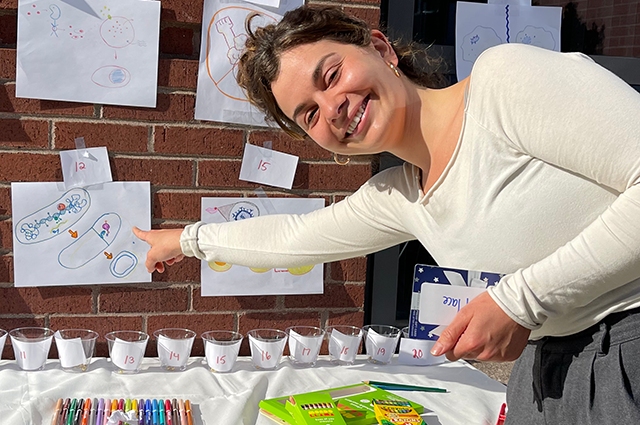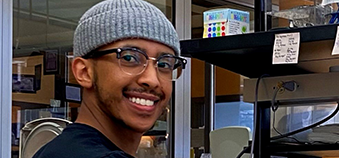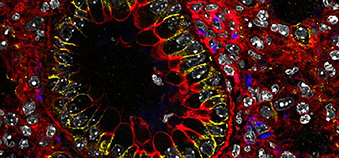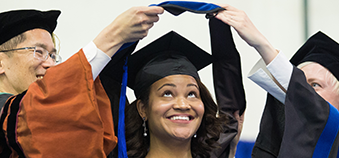Molecular Microbiology
| Program Start | Length | Funding | Stipend |
|---|---|---|---|
SEPTEMBER | 5.5 - 6 YEARSon average | FULL TUITION | $45,0002025-2026 |
Build a Career in Impactful Research
The PhD in Molecular Microbiology (MMB) at Tufts University Graduate School of Biomedical Sciences prepares students for exciting careers at the forefront of biomedical science. With a strong emphasis on host-microbe interactions, microbial genetics, and infectious disease biology, our program offers research-driven training that spans bacteria, viruses, fungi, and parasites. From day one, students are immersed in collaborative research experiences supported by internationally recognized faculty and state-of-the-art facilities.
World-Class Faculty and Interdisciplinary Expertise
The MMB PhD program offers interdisciplinary research opportunities across Tufts Schools of Medicine, Arts & Sciences, and Veterinary Medicine. Students gain access to internationally recognized faculty experts in microbial genetics, immunology, and infectious diseases—including members of the National Academy of Sciences and HHMI investigators. With hands-on lab rotations and collaborative mentorship, you’ll explore topics like microbial genomics, vaccine development, and host–pathogen interactions—advancing research that impacts global health.

Research-Focused Curriculum with Immediate Lab Engagement
Our curriculum integrates advanced coursework with hands-on laboratory training and seminar-based learning. Students complete three lab rotations in their first year to explore diverse scientific approaches, discover mentorship styles, and find the best fit for their dissertation research. Throughout the program, students refine their technical skills, critical thinking, and scientific communication—culminating in a qualifying examination that marks their transition to independent research.
Specialized NIH-Funded Training Tracks
Students can personalize their training through two NIH-supported tracks:
- MERGE-ID (Medically-Oriented Research in Graduate Education on Infectious Disease) focuses on hypothesis-driven research into the treatment, diagnosis, and prevention of infectious diseases.
- Molecular Genetics offers rigorous foundational training in microbial molecular genetics and mechanisms of gene expression and regulation.
These optional tracks provide structured mentorship, additional funding opportunities, and career-relevant expertise.

Cutting-Edge Research in a Collaborative Environment
MMB students gain hands-on experience in 21 active research labs equipped with advanced microbiological tools and technologies. Collaboration is built into the fabric of our program—faculty, students, and postdocs frequently co-author publications, share resources, and support each other’s growth. Regular seminars, journal clubs, and thesis defenses create a vibrant intellectual atmosphere where scientific curiosity is nurtured and celebrated.
Molecular Microbiology Activities
Our program sponsors a range of social events throughout the year to build community spirit and remind everyone that graduate school can be fun.
Program Contact Information
Katya Heldwein, PhD
Program Director
Jackie Kulas
Program Coordinator
Career Outcomes Across Academia, Industry, and Beyond
Graduates of the MMB program are exceptionally well-prepared for diverse scientific careers. Many pursue postdoctoral research and academic faculty positions, while others thrive in biotechnology, clinical microbiology, pharmaceutical R&D, science communication, and policy. Our program supports individualized career development and provides access to a robust professional network.

Become a Microbiologist – Apply Today
We welcome applications from highly motivated students with a passion for microbiological research. Competitive applicants typically hold undergraduate degrees in biology or related fields, have research experience, and demonstrate curiosity, communication skills, and a collaborative mindset. We especially encourage individuals from diverse backgrounds to apply.
Meet Our Students
Our students come from across the US and the world and are pursuing a wide range of thesis projects.
Student Publications
Publication of research is a key part of training and our students publish their work in excellent journals.
Program Outcomes
Over 90% of our students complete an advanced degree and go on to pursue a wide range of careers.
Molecular Microbiology Career Outcomes and Graduation Statistics
Contact Information
Katya Heldwein, PhD
Program Director
Andrew Camilli, PhD
Admissions Director
Jackie Kulas
Administrative Coordinator




